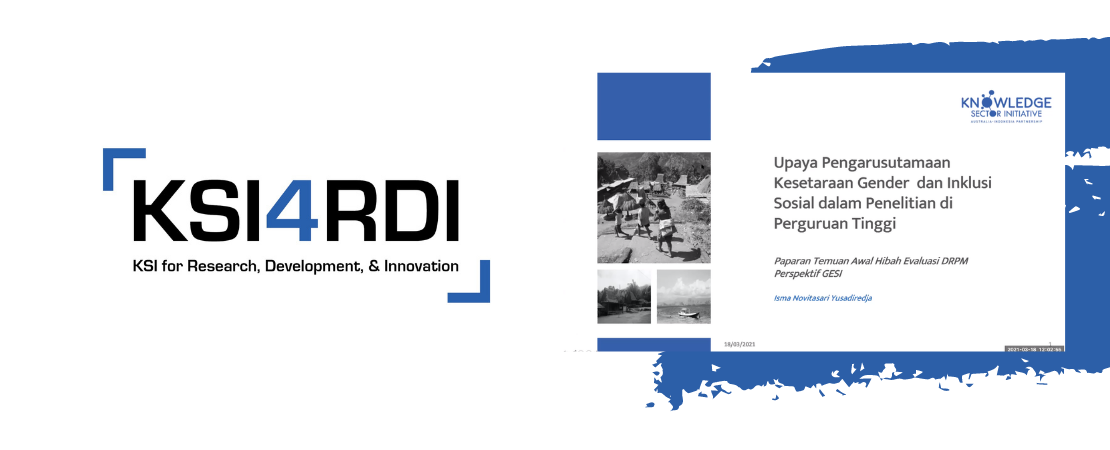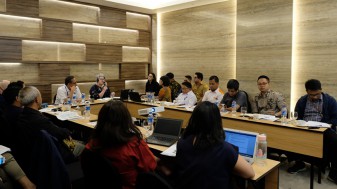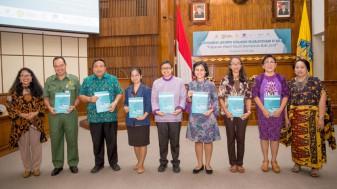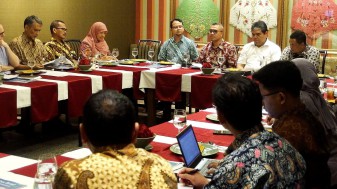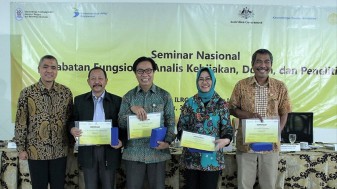The mainstreaming of gender and social inclusion perspective or GESI in research and community service activities requires cooperation from all relevant parties. To this end, actors focusing on GESI perspective, both individuals and organizations, need to establish networking in order to collaborate together.
This is one of the conclusions reached in KSI4RDI#13 event themed “Sustainability Discussion on the Advocacy of GESI Perspective Mainstreaming in Research and Community Service”. This online discussion held Thursday (18/3) was attended by representatives from a number of organizations, including the Indonesian Association of Women/Gender & Child Studies (ASWGI), Indonesian Young Academy of Science (ALMI), Australia-Indonesia Disability Research and Advocacy Network (AIDRAN), Cakra Wikara Indonesia (CWI), Science and Technology Excellence Centre for Higher Education (PUI-PT), HIV/AIDS Research Centre of Unika Atma Jaya (PPH Atma Jaya), Indonesian Science Institution (LIPI) and The Conversation Indonesia. This event was organised and facilitated by Knowledge Sector Initiative (KSI).
KSI Team Leader, Jana Hertz, felt honoured to partner with many organisations in Indonesia. KSI is a partnership program between the Australian and Indonesian Government to support evidence-based policy in Indonesia. In this context, mainstreaming GESI perspective in research is crucial because it will influence policy. “This series of discussions is important to ensure that GESI issues remains addressed in research and policy formulation going forward,” she said.
In this event, KSI invited participants to introduce themselves and explain their vision and future plans on mainstreaming GESI perspective. In addition, participants were asked to give their response to initial findings of the evaluation results of the research grant given by the Directorate of Community Service Research (DRPM) of the Ministry of Research and Technology/National Research and Innovation Agency (BRIN), delivered by KSI.
The Head of ASWGI, Emy Susanti, explained that her association consists of gender and child study centres based in universities across Indonesia. This association was established in 2015 to deliver the Three Principles of higher education, namely education, research, and community service, by incorporating GESI perspective. “Currently ASWGI has 140 member organisations from public, private, and religious universities,” she said.
Ina Hunga from ASWGI added that in 2013, there were only 2 percent of researches with GESI perspective funded by DRPM Kemenristek. In 2017, this number increased to 7 percent. This association has also prepared a university ranking indicator based on GESI aspect. Moving forward, ASWGI is focusing on a number of activities, among others is to promote the ratification of the Bill on Sexual Violence Eradication (PKS) and abolishing sexual violence at the higher education level. Additionally, ASWGI will engage itself as a reviewer for DPRM’s grants to ensure the inclusion of GESI perspective in these grants.
Meanwhile, the Head of ALMI, Sri Fatmawati, explained that her institution was established in 2015 to promote a scientific culture in Indonesia. This institution has 64 members, divided into four working groups. ALMI is focused on including GESI perspective in the academic world, including how to increase women’s participation in researches on science. Going forward, ALMI will cover the issue of diversity in its research, which will include GESI perspective mainstreaming.
Furthermore, the Head of CWI, Anna Margaret, said that her organisation is a research organisation focusing on political policies. CWI works with a belief that the gender perspective is relevant to any social and political analysis. Therefore, there can be so many varieties of research themes.
Also, the Head of AIDRAN Indonesia, Slamet Thohari, stated that his organisation was established in 2018 by disability activists in Indonesia and Australia to mainstream disability issue in the academic world. In fact, the academic world greatly influences policy formulation.
In the future, AIDRAN plans to hold a workshop for researchers so that they understand the importance of including the issue of disability in their research. People with different abilities need to be involved in research so that they are not just being written, but also writing to voice their own stories. Thus, this workshop also targets people with different abilities to enable them to conduct research.
Next, the Editor-in-Chief of The Conversation Indonesia, Prodita Sabarini, explained that her organisation is an online media that focuses on promoting research results from the academic world to be accessed by the wider community using a lay language, including research results on GESI issues. In Indonesia, since its launching in 2017, The Conversation Indonesia has published more than 50 articles with GESI issues. Going forward, her organisation will highlight researches with GESI perspective more by publishing them and promoting GESI perspective in developing program and activities.
Research Grant
This meeting served as a space to ask for responses to the initial findings of the DPRM Kemenristek/BRIN grant recipient research results during 2017-2021. This research aims to examine the extent of mainstreaming efforts to promoting GESI-based research in higher education/universities. This research collected research proposal data during 2017 – 2021. The sorting was done by establishing 25 keywords representing GESI issues.
Initial findings shows that GESI-related keywords in 2019 increased to 2,905 from 37,750 proposals, from previously 2,832 from 44,051 proposals. From this number, proposals that received grants reached 4.75 percent per year. The key word “empowerment” was most often found in research titles, around 60 percent, followed by poverty, women, gender, HIV/AIDS, and disability.
Responding to these findings, ASWGI emphasises that we need to review the indicators developed in research. In order to capture the GESI perspective, Ina Hunga said that we need to look further than just the proposals’ title and abstract. The whole content of the proposals needs to be looked at as well.
Meanwhile, Evi Eliyanah from ALMI proposed that GESI elements are also included as one of the questions in grant proposals, so that reviewers can examine the presence of GESI elements in each proposal. Additionally, it needs to be checked whether the researchers’ composition is diverse or not.
This KSI4RDI discussion series will continue until the end of 2021, in accordance with KSI program implementation. Hence, there needs to be an effort that ensures the sustainability of the advocacy of GESI perspective mainstreaming in research and community service in Indonesia without the support of KSI Program. The second meeting will be held on April 16, aiming to identify issues and mutual vision and mission in advocating GESI perspective mainstreaming in research and community service in Indonesia.
KSI4RDI (KSI for Research, Development and Innovation) is an interactive discussion initiated by KSI, a partnership between the Indonesian and Australian Government, funded by the Australian Department of Foreign Affairs and Trade (DFAT). The KSI4RDI discussion is held twice a month, with the objective of supporting the improved use of evidence in the policy making process, which will directly encourage policymakers to produce more inclusive and correctly targeted policies.

